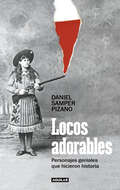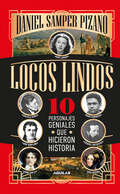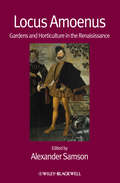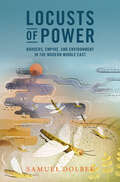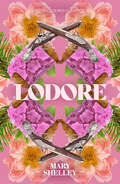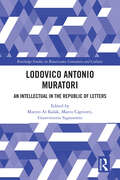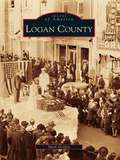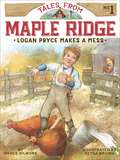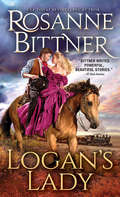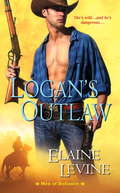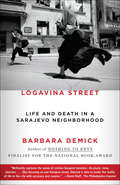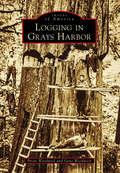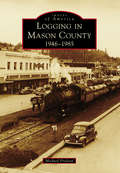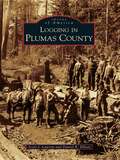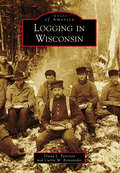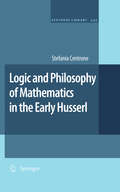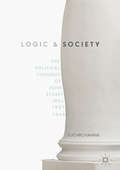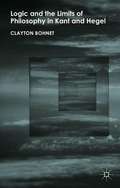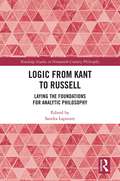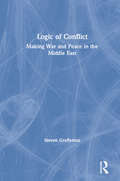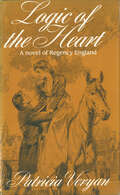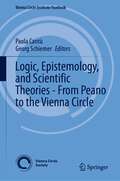- Table View
- List View
Locos adorables: Personajes geniales que hicieron historia
by Daniel Samper PizanoEl nuevo libro del periodista Daniel Samper nos descubre las extravagantes, originales y divertidas historias de vida de 10 personajes tan excéntricos como memorables No conoces a Ada Byron ni su gran hazaña en el mundo de la informática, pero quizá sí a su padre, Lord Byron. Tampoco sabes quién es el cocinero François Vatel, pero habrás oído hablar de los suntuosos banquetes que daba Luis XIV en su corte. Y por supuesto no te sonará el nombre de Annie Oakley, pero sí el de sus coetáneos Toro sentado y Buffalo Bill. Y es que detrás de cada gran hombre o mujer hay, sin duda, un loco adorable con una increíble vida que deberías conocer. Y Daniel Samper ha descubierto en este libro diez de las más fascinantes: François Vatel, Aimé Bonpland, Ada Byron, Temístocle Solera, Ezequiel Uricoechea, Annie Oakley, Graciela Olmos, Sidney Franklin, Hedy Lamarr y Mané Garrincha son los excéntricos e interesantísimos protagonistas de las historias injustamente desconocidas que componen estas páginas y que te enamorarán.
Locos lindos
by Daniel Samper PizanoEsta es la lista de locos lindos adorables que hicieron historia en actividades propias de su oficio Alrededor de ellos revolotean decenas de personajes y escenarios: el rey Luis XIV, Humboldt, el tenebroso Doctor Francia, Lord Byron, Verdi, Rufino José Cuervo, Búfalo Bill, el cacique Toro Sentado, Pancho Villa, Ernest Hemingway, figuras del partido Nazi alemán, artistas de Hollywood, la selva amazónica, la II Guerra Mundial, la guerra civil española, los chibchas, la reina Victoria, el rey Pelé y el Junior de Barranquilla.
Locus Amoenus: Gardens and Horticulture in the Renaissance (Renaissance Studies Special Issues #10)
by Alexander SamsonLocus Amoenus provides a pioneering collection of new perspectives on Renaissance garden history, and the impact of its development. Experts in the field illustrate the extent of our knowledge of how the natural world looked and how humans related to their environment. A ground-breaking collection of new perspectives on garden history Essays demonstrate the extent of our knowledge of how the natural world looked and how humans related to their environment The book's broad coverage includes botany and herbals, literary reflections of changing ideas of landscape and nature, and human's place within it Contributors come from a wide range of experts, including archaeologists, scholars and the librarian and archivist to the Royal Horticultural Society Reflects the growing emergence of this field, which has been assisted both by archaeology and ideas from green studies and environmental criticism Richly illustrated throughout
Locust: The Devastating Rise and Mysterious Disappearance of the Insect that Shaped the American Frontier
by Jeffrey A. LockwoodAs an entomologist, Lockwood (natural sciences and humanities, U. of Wyoming) found the explanation of the Rocky Mountain locust's extinction ecologically implausible, and reopened the case, at first for entirely objective reasons and using purely professional methods. But the story was embedded in the history of the US west and entangled with a number of controversies. Annotation ©2004 Book News, Inc. , Portland, OR (booknews. com)
Locusts of Power: Borders, Empire, and Environment in the Modern Middle East (Studies in Environment and History)
by Samuel DolbeeIn this highly original environmental history, Samuel Dolbee sheds new light on borders and state formation by following locusts and revealing how they shaped both the environment and people's imaginations from the late Ottoman Empire to the Second World War. Drawing on a wide range of archival research in multiple languages, Dolbee details environmental, political, and spatial transformations in the region's history by tracing the movements of locusts and their intimate relationship to people in motion, including Arab and Kurdish nomads, Armenian deportees, and Assyrian refugees, as well as states of the region. With locusts and moving people at center stage, surprising continuities and ruptures appear in the Jazira, the borderlands of today's Iraq, Syria, and Turkey. Transcending approaches focused on the collapse of the Ottoman Empire or the creation of nation states, Dolbee provides a new perspective on the modern Middle East grounded in environmental change, state violence, and popular resistance.
Lodore (Rediscovered Classics)
by Mary ShelleyAlso published as The Beautiful Widow, Mary Shelley&’s penultimate novel explores the web of relationships between three women bound together by the exacting Lord Lodore: Cornelia, Lodore&’s estranged wife, ruled by her mother and the norms of aristocratic society; Ethel, his daughter, raised in the wilderness of Illinois and utterly reliant on her father; and finally, the independent and highly educated Fanny Derham, the daughter of Lodore&’s childhood friend. Long considered the most Austen-like and socially oriented of Mary Shelley&’s novels, Lodore is an essential read for anyone seeking to understand this brilliant feminist writer.
Lodovico Antonio Muratori: An Intellectual in the Republic of Letters (Routledge Studies in Renaissance Literature and Culture)
by Matteo Al Kalak Marco Capriotti Gianvittorio SignorottoLodovico Antonio Muratori (1672–1750) was one of the most prominent intellectuals of eighteenth-century Europe. His scholarship spanned from philosophy to jurisprudence, from history to epigraphy, from theology to medicine, and his political and social vision was regarded as the manifesto of the prevailing politics on the Peninsula in the first half of the eighteenth century (the so-called “Muratorian age”), precursing the Age of Enlightenment. However, despite his undisputed importance, there is not adequate awareness of Muratori’s work and personality outside of Italy. Lodovico Antonio Muratori: An Intellectual in the Republic of Letters aims at providing scholars with a reference tool on Muratori’s life and works, featuring contributions of both distinguished and young international scholars on all the main aspects of his production, taking into account European politics, culture, philosophy, history, law, medicine, and the society of the first half of eighteenth century.
Log Cabins and Outbuildings: A Guide to Building Homes, Barns, Greenhouses, and More
by The United States Department of AgricultureHomesteading is a lifestyle that people around the world gravitate toward—and for good reason. In today&’s high-stress world, many people dream of heading off to their own cabin in the woods or to their large rural oasis to escape the anxieties and complexities of daily life, to live in a more natural state. Others have embraced the agricultural lifestyle of farming as a career, serving as fundamental contributors to sustaining society. With this classic guide from the US Department of Agriculture (USDA), learn about the architecture of rural life and the design elements of these amazing structures. This manual, originally published and distributed in 1972, includes government-issued designs and requirements for log cabins, farmhouses, firepits and barbecues, greenhouses, storage sheds, stables, and more! Black-and-white diagrams and illustrations fill these pages, displaying the intricacies and dimensions of these incredible structures in their entirety. Brimming with ideas and inspiration, Log Cabins and Outbuildings is the perfect starting point for building your new rural retreat.
Logan County
by Mark GriffinAs one of Kentucky's oldest counties, Logan County has a colorful history. Residents found religion at the Red River Meeting House during the Second Great Awakening. However, the land once known as Rogue's Harbor has been wrought with lawlessness. Visitors to the county today can tour the bank in the county seat of Russellville where the infamous Jesse James started his robbing spree in 1868. Tourists and residents alike are regaled with stories of a dueling Andrew Jackson and countless corrupt elections. Four men went on to become governors, while a fifth attempt fell short despite an infamous campaign. All of these things are documented in Images of America: Logan County along with the less controversial events in history: the everyday farmers who raised their cash crop of tobacco to contribute to a growing community and the establishment of the most southwestern of the Shaker communities at South Union.
Logan Pryce Makes a Mess
by Grace Gilmore Petra BrownMeet Logan Pryce, an eight-year-old boy whose family hardships are made better by his small-town community in this start to a wholesome series that's like Little House on the Prairie for younger readers.It's 1892 in Maple Ridge, Illinois, and Logan Pryce is worried about his family. His dad, Dale, needs to find a new job because their farm is failing. He may even need to look for work in another city. Logan offers to earn some money by selling his latest invention, but his parents tell him not to worry and that everything will be fine. Then Dale is hired for a temporary job at the general store, and Logan can't wait to lend a hand! But his eagerness may cause his dad to lose the job he so badly needs. Can Logan's mistake be fixed in time? With easy-to-read language and illustrations on almost every page, the Tales from Maple Ridge chapter books are perfect for beginning readers.
Logan's Lady
by Rosanne BittnerTwo worlds in conflict Two untamed hearts intertwined One love worth fighting forWealthy Englishwoman Lady Elizabeth Baylor longs for adventure. She leaves for America full of hope, only to lose everything to a villain hiding treachery behind his smile. Lost in this strange and lawless land, Elizabeth vows to track down the man who did her wrong…but she can't do it alone. What she needs is someone hardened by the west and unflinching toward its dangers: notorious bounty hunter Logan Best.Ill-mannered and seemingly ruthless, Logan exorcises his dark past by throwing himself into his vengeful profession?hunting wanted men. There's nothing about the pampered Englishwoman that should call to him, and yet as their adventure takes them across the wild and treacherous west, the lonely hunter realizes he'll do anything to keep her safe…and defend his Lady to his final breath.A sweeping, emotional historical western romance, perfect for fans of Jo Goodman and Leigh Greenwood!
Logan's Outlaw
by Elaine LevineConfident and coolheaded, nothing shakes a Man of Defiance--except a woman he can't resist. . .Sarah Hawkins survived capture by the Sioux, but after her escape she faced public scorn. Now, she'll do anything to start over, and the dusty town of Defiance promises the anonymity and security she needs. Before she melts into the shadows, though, it's her mission to put a great injustice to rights, and that means jeopardizing her safety once more. But this time, she's not alone. Without meaning to, Sarah has fallen under the protection of Logan Taggert, a rough-and-tumble trader unused to caring for others--and yet unable to ignore the tempting, tenacious woman's plight. Though she refuses to trust him, Logan won't leave her side, keeping her one step ahead of danger. . .even as she takes hold of the very thing he never thought he'd risk: his heart. "A beautiful romance. . .that keeps the reader hooked from the first page to the last." --New York Times bestselling author, Catherine Anderson on Leah and the Bounty Hunter "Plenty of action makes this rough-and-ready Western one that fans are sure to enjoy." --Library Journal on Audrey and the Maverick
Logavina Street: Life And Death In A Sarajevo Neighborhood
by Barbara DemickLogavina Street was a microcosm of Sarajevo, a six-block-long history lesson. For four centuries, it existed as a quiet residential area in a charming city long known for its ethnic and religious tolerance. On this street of 240 families, Muslims and Christians, Serbs and Croats lived easily together, unified by their common identity as Sarajevans. Then the war tore it all apart. As she did in her groundbreaking work about North Korea, Nothing to Envy, award-winning journalist Barbara Demick tells the story of the Bosnian War and the brutal and devastating three-and-a-half-year siege of Sarajevo through the lives of ordinary citizens, who struggle with hunger, poverty, sniper fire, and shellings. Logavina Street paints this misunderstood war and its effects in vivid strokes--at once epic and intimate--revealing the heroism, sorrow, resilience, and uncommon faith of its people. With a new Introduction, final chapter, and Epilogue by the author
Logging in Grays Harbor
by Gene Woodwick Brian WoodwickGrays Harbor reigned supreme as the "Logging Capital of the World" for 150 years. Homesteaders became loggers and hired local Indians, who had logged the area's massive trees since ancient times. Sailors, too, were hired to rig spar trees. They fearlessly plied lumber schooners across destructive waters and carried timber products to the East Coast, South America, and other foreign ports. Over time, power saws replaced crosscut saws, and logging methods evolved. Today, loggers in Grays Harbor have begun a new phase of producing timber products that is built on a heritage of strong families, good citizens, and hard work.
Logging in Mason County: 1946-1985
by Michael FredsonIn 1946, the US Forest Service and Simpson Logging Company agreed to a sustained yield unit, cooperatively managing lands for 100 years for "community stability." Championed by USFS chief William Greeley and dubbed the "Sustained Steal" by detractors, the Shelton Cooperative Sustained Yield Unit nonetheless provided jobs for returning World War II veterans. Simpson Logging built the largest logging camp in the continental United States, Camp Grisdale, which had a two-room school and a two-lane bowling alley. Shelton and McCleary were saved from becoming ghosts towns, and downtown Shelton was modernized with a shopping center, parks, and schools. Mason County's Forest Festival was a weekend celebration for 30,000 visitors that included a parade and logging shows. As the only cooperative unit established in the United States, it attracted national attention, including TV personality Arthur Godfrey. In 1961, the movie Ring of Fire was filmed above Camp Grisdale. As World War II memories faded, logging practices were challenged by notions of wilderness and recreation. Improved equipment reduced the jobs, and when Simpson withdrew from the sustained yield agreement, employees were disenfranchised.
Logging in Plumas County
by Scott J. Lawson Daniel R. ElliottLocated within the northern Sierra Nevada mountain range, the forests of Plumas County were once seen as a source of endless timber. Lumber was needed during the Gold Rush for water flumes, mine timbers, and an array of buildings. While timber was abundant, the abilities of the early settlers to harvest, transport, and mill the logs were often very limited. Markets remained relatively local throughout the second half of the 19th century until the completion of the Western Pacific Railroad in 1909. This sparked a new rush of industry into the region. Vast tracts of untapped Plumas County timber were bought up by speculators, and many sawmills were erected. Logging in the western United States moved from animal power to steam engines to internal combustion in the space of about 50 years. While Plumas County's lumber industry was reflective of these developments, it also found its own identity as a timber-producing region that was nearly unequaled.
Logging in Wisconsin (Images of America)
by Carrie M. Ronnander Diana L. PetersonWisconsin was the perfect setting for the lumber industry: acres of white pine forests (acquired through treaties with American Indians) and rivers to transport logs to sawmills. From 1840 to 1910, logging literally reshaped the landscape of Wisconsin, providing employment to thousands of workers. The lumber industry attracted businessmen, mills, hotels, and eventually the railroad. This led to the development of many Wisconsin cities, including Eau Claire, Oshkosh, Stevens Point, and Wausau. Rep. Ben Eastman told Congress in 1852 that the Wisconsin forests had enough lumber to supply the United States “for all time to come.” Sadly, this was a grossly overestimated belief, and by 1910, the Wisconsin forests had been decimated. Logging in Wisconsin explores the 70 years when logging ruled the state, covering the characters who worked in forests and on rivers, the tools they used, and the places where they lived and worked.
Logic and Philosophy of Mathematics in the Early Husserl
by Stefania CentroneLogic and Philosophy of Mathematics in the Early Husserl focuses on the first ten years of Edmund Husserl's work, from the publication of his Philosophy of Arithmetic (1891) to that of his Logical Investigations (1900/01), and aims to precisely locate his early work in the fields of logic, philosophy of logic and philosophy of mathematics. Unlike most phenomenologists, the author refrains from reading Husserl's early work as a more or less immature sketch of claims consolidated only in his later phenomenology, and unlike the majority of historians of logic she emphasizes the systematic strength and the originality of Husserl's logico-mathematical work. The book attempts to reconstruct the discussion between Husserl and those philosophers and mathematicians who contributed to new developments in logic, such as Leibniz, Bolzano, the logical algebraists (especially Boole and Schröder), Frege, and Hilbert and his school. It presents both a comprehensive critical examination of some of the major works produced by Husserl and his antagonists in the last decade of the 19th century and a formal reconstruction of many texts from Husserl's Nachlaß that have not yet been the object of systematical scrutiny. This volume will be of particular interest to researchers working in the history, and in the philosophy, of logic and mathematics, and more generally, to analytical philosophers and phenomenologists with a background in standard logic.
Logic and Philosophy of Mathematics in the Early Husserl (Synthese Library #345)
by Stefania CentroneLogic and Philosophy of Mathematics in the Early Husserl focuses on the first ten years of Edmund Husserl’s work, from the publication of his Philosophy of Arithmetic (1891) to that of his Logical Investigations (1900/01), and aims to precisely locate his early work in the fields of logic, philosophy of logic and philosophy of mathematics. Unlike most phenomenologists, the author refrains from reading Husserl’s early work as a more or less immature sketch of claims consolidated only in his later phenomenology, and unlike the majority of historians of logic she emphasizes the systematic strength and the originality of Husserl’s logico-mathematical work. The book attempts to reconstruct the discussion between Husserl and those philosophers and mathematicians who contributed to new developments in logic, such as Leibniz, Bolzano, the logical algebraists (especially Boole and Schröder), Frege, and Hilbert and his school. It presents both a comprehensive critical examination of some of the major works produced by Husserl and his antagonists in the last decade of the 19th century and a formal reconstruction of many texts from Husserl’s Nachlaß that have not yet been the object of systematical scrutiny. This volume will be of particular interest to researchers working in the history, and in the philosophy, of logic and mathematics, and more generally, to analytical philosophers and phenomenologists with a background in standard logic.
Logic and Society: The Political Thought of John Stuart Mill, 1827-1848
by Yuichiro KawanaThis book discusses John Stuart Mill’s intellectual activity from about 1827 to 1848, namely between his recovery from his so-called ‘Mental Crisis’ and the publication of Principles of Political Economy. During this period, along with deepening his understanding of contemporary society as commercial civilization, Mill aspired to create a new system of science of society which would inquire into the nature, process of historical change, and prospects of society. Among the indispensable constituent sciences of his system, this book pays particular attention on his projected sciences of history and of the formation of character (ethology), and clarifies that the implications of his interest in these sciences were more significant for the better understanding of Mill’s political thought than many scholars have assumed.
Logic and the Limits of Philosophy in Kant and Hegel
by Clayton BohnetThis text examines the boundary between philosophy and formal logic in Kant and Hegel. It takes up the particular category of 'quantity' as a point around which to explore Kant's and Hegel's larger architectonic concerns. Analysis of the relation in Kant between quantity in formal logic and in his transcendental logic reveals two complementary but distinct approaches that preserve the boundary between philosophy and formal logic. By contrast, in Hegel's Science of Logic we find both a novelapproach to the traditional treatment of quantity in logic, and a reconstruction of the relation of logic to all other determinations of thought. By basing its examination of the relation of formal logic and philosophy in Kant and Hegel on a detailed analysis of quantity, Logic and the Limits of Philosophy in Kant and Hegel provides a resource for an historically informed interpretation of the revolutions in logic that marked the onset of our digital age.
Logic from Kant to Russell: Laying the Foundations for Analytic Philosophy (Routledge Studies in Nineteenth-Century Philosophy)
by Sandra LapointeThe scope and method of logic as we know it today eminently reflect the ground-breaking developments of set theory and the logical foundations of mathematics at the turn of the 20th century. Unfortunately, little effort has been made to understand the idiosyncrasies of the philosophical context that led to these tremendous innovations in the 19thcentury beyond what is found in the works of mathematicians such as Frege, Hilbert, and Russell. This constitutes a monumental gap in our understanding of the central influences that shaped 19th-century thought, from Kant to Russell, and that helped to create the conditions in which analytic philosophy could emerge. The aim of Logic from Kant to Russell is to document the development of logic in the works of 19th-century philosophers. It contains thirteen original essays written by authors from a broad range of backgrounds—intellectual historians, historians of idealism, philosophers of science, and historians of logic and analytic philosophy. These essays question the standard narratives of analytic philosophy’s past and address concerns that are relevant to the contemporary philosophical study of language, mind, and cognition. The book covers a broad range of influential thinkers in 19th-century philosophy and analytic philosophy, including Kant, Bolzano, Hegel, Herbart, Lotze, the British Algebraists and Idealists, Moore, Russell, the Neo-Kantians, and Frege.
Logic of Conflict: Making War and Peace in the Middle East
by Steven GreffeniusThe author’s argument ties this literature to a field that is often called the logic of inquiry. He criticizes an influential and deliberately analytical approach to the study of international conflict and show what can be gained by bringing more integrative or synthetic approaches to bear on problems in the field. The study started as an effort to work out some problems in international relations theory and it has remained that through eight years of writing and research. Still, the book is more than incidentally about the Middle East, and evidence from the region informs the argument made here. This evidence is of two kinds: traditional historical material from both primary and secondary sources, and data on events that have occurred during the course of both conflictual and cooperative exchanges between the actors there. The treatment focuses on the relationship between Egypt and Israel between 1967 and 1979, a period that saw their relations pass from the most intense antagonism to a reasonable degree of comity if not friendship.
Logic of the Heart: A Novel of Regency England (Sanguinet Saga)
by Patricia VeryanPatricia Veryan's delightful Regency novels have inspired Library Journal to call her "the superstar of the period romance" and The Chattanooga Times to hail her as "a worthy successor to Georgette Heyer at her very best." In Logic of the Heart, once again she brings us an irresistible blend of love and danger when she matches the enchanting Susan Henley with dashing Valentine Montclair...
Logic, Epistemology, and Scientific Theories - From Peano to the Vienna Circle (Vienna Circle Institute Yearbook #29)
by Georg Schiemer Paola CantùThis book provides a collection of chapters on the development of scientific philosophy and symbolic logic in the early twentieth century. The turn of the last century was a key transitional period for the development of symbolic logic and scientific philosophy. The Peano school, the editorial board of the Revue de Métaphysique et de Morale, and the members of the Vienna Circle are generally mentioned as champions of this transformation of the role of logic in mathematics and in the sciences. The scholarship contained provides a rich historical and philosophical understanding of these groups and research areas. Specifically, the contributions focus on a detailed investigation of the relation between structuralism and modern mathematics. In addition, this book provides a closer understanding of the relation between symbolic logic and previous traditions such as syllogistics. This volume also informs the reader on the relation between logic, the history and didactics in the Peano School. This edition appeals to students and researchers working in the history of philosophy and of logic, philosophy of science, as well as to researchers on the Vienna Circle and the Peano School.
